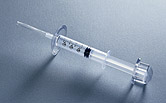
MONDAY, Jan. 24 (HealthDay News) — Preparing small doses of medications from syringes can be inaccurate and lead to dangerous dosing errors for infants and small children, warns a new study.
The problem is that small doses of potent drugs for young patients are often prepared from stock of less than 0.1 millileter (mL) in size, but the equipment does not permit the accurate measurement of volumes that small, explained study author Dr. Christopher Parshuram, of the University of Toronto.
And medications that most often require small doses include powerful narcotics and sedatives such as morphine, lorazepam and fentanyl, as well as immunosuppressants, noted Parshuram, who works in the Department of Pediatrics at The Hospital for Sick Children and directs Pediatric Patient Safety Research at the University of Toronto Center for Patient Safety.
It’s a Catch-22, he and his colleagues acknowledge. “The safe administration of medications requires formulations that permit accurate preparation and administration, but current equipment does not permit the accurate measurement of volumes less than 0.1 mL,” said Parshuram in a Canadian Medical Association
Journal news release.
In both hypothetical and clinical studies, he and his colleagues looked at 71,218 intravenous doses given to 1,531 infants and children admitted to an intensive care unit in 2006. Of those doses, 7.4 percent of the children and babies needed preparations of less than 0.1 mL of stock solution, and 17.5 percent needed preparations of less than 0.2 mL.
“Our findings indicate a substantial source of dosing error that involved potent medications and affected more than a quarter of the children studied,” the researchers wrote.
“Small volumes of stock solution are required because of the relatively low doses needed for infants and young children and the relatively high concentrations of commercially available stock solutions,” they added. “The clinical [consequences] of errors occurring as a result of preparing doses from small volumes will be compounded by incomplete safety data, errors in medication orders, and errors in preparation or administration.”
Since the preparation of small doses of medication is common in pediatric hospitals across North America, there is a need to review preparation methods, regulatory requirements and manufacturing processes, the researchers concluded.
The study appears in the current issue of the Canadian Medical Association Journal.
More information
The U.S. Food and Drug Administration has more about giving medications to children.

